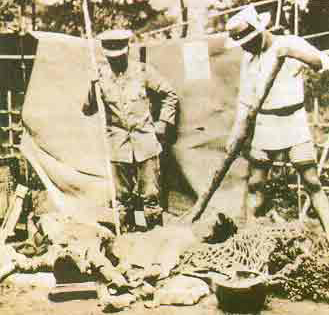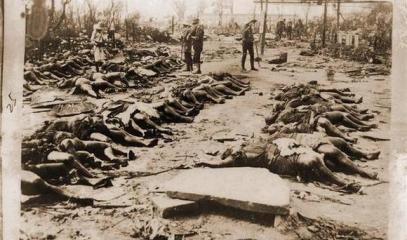Kantō massacre centennial throws the spotlight on a still open wound between Tokyo and Seoul
On 1 September 1923, a devastating earthquake followed by fires fuelled by a typhoon killed more than 100,000 people. Thousands of Koreans and Chinese were slaughtered following false accusations. Separate ceremonies were held in Japan today to mark the events. A hundred years later, the call for justice and the demand for an apology still fall on deaf ears.
Tokyo (AsiaNews) – This morning Japan commemorated the victims of the Great Kantō earthquake, which struck the Kantō Plain, Honshū Island, on the morning of 1 September 1923, with a magnitude of 7.9 deep beneath Sagami Bay, lasting between four and 10 minutes.
The tremors devastated Tokyo, the port of Yokohama and the prefectures of Chiba, Kanagawa and Shizuoka, with the number of victims set at between 100,000 and 142,000, plus some 37,000 missing, presumed dead.
In addition to the memorial ceremonies for the dead, separate commemorations were held for the Koreans and Chinese killed following the disaster because they were held responsible for the event or accused of exploiting the tragedy to steal and rob.
In order to mark the tragedy, the Japanese government designated 1 September as Disaster Prevention Day, during which exercises and emergency simulations are carried out to boost citizens' awareness and preparedness.
Prime Minister Fumio Kishida took part in one such exercise in Tokyo, while Yokoamicho Park in the Japanese capital hosted a commemoration to honour the memory of the 39,000 confirmed victims in the city.
In addition to large-scale loss of life, the quake caused economic damages estimated at 5.5 billion yen (US$ 37.8 million), equal to about 37 per cent of Japan's gross national product at the time.
To make matters worse, the quake sparked fires as many families were gathered for the noon meal. A typhoon that brought high winds Noto Peninsula, north of Tokyo, fed the flames.
Panic and confusion fuelled uncontrolled rumours across the country, with false reports of the destruction of the capital, the collapse of Parliament, the sinking of the same region hit by the tremors and others covered by the eruption of volcanoes.
The Home Ministry imposed martial law, which proved ineffective, especially for the Korean community accused of looting, stealing, and setting fires, and, according to some reports at the time, poisoning the wells.
Koreans were hunted down, resulting in summary executions, killings, beatings even of some Japanese mistaken for foreigners.
The number of victims is still unknown. Japanese authorities put the toll at 231 deaths among Koreans, while independent studies suggest at least 2,500 deaths from the xenophobic wave unleashed by the disaster.
Over 360 Japanese ended up on trial for murder, but none of them were convicted and the few who ended up in prison were pardoned for the wedding of the then Crown Prince Hirohito.
Alongside the ceremonies for earthquake victims, parallel memorial services were held in Tokyo and other places for those killed in the massacres, a story that is still controversial today and never fully acknowledged by Japanese leaders.
This anniversary is a further element of tensions between Japan and South Korea, at a time when both Tokyo and Seoul have started a difficult rapprochement (against Beijing and Pyongyang), compounded by the recent controversy over the release of radioactive waters from the Fukushima nuclear plant.
Reports from 1923 note that for several days, mobs with swords, iron bars and bamboo sticks went "hunting" for Koreans to kill. According to some historians, soldiers in Japan’s imperial army with ordinance machine guns also participated in the expeditions.
Yet, Japan has not engaged so far in any serious historical review of the controversial affair, which remains an open wound.
Kim Do-im, 86, believes her uncle was among those murdered in the burning ruins of Tokyo after the quake. His body was never found.
“His tomb is in Korea but it doesn’t contain his ashes,” she told Agence France Presse. He “was 33 when he died. He had three children,” she explained. “I first heard the story when I was around five years old It hurts my heart.”
For Lin Boyao, co-chair of the executive committee for the 100th anniversary of the massacres, "In order for us to ensure that such things never happen again, we must know the facts, receive apologies for those facts, and people must be informed.”
Speaking during a press conference at the Foreign Correspondents' Club of Japan in Tokyo, he noted that the Japanese government has not yet apologised for the massacres that followed the great earthquake and has not compensated any of the victims.
12/02/2016 15:14
24/10/2019 17:56
10/09/2004








.png)










